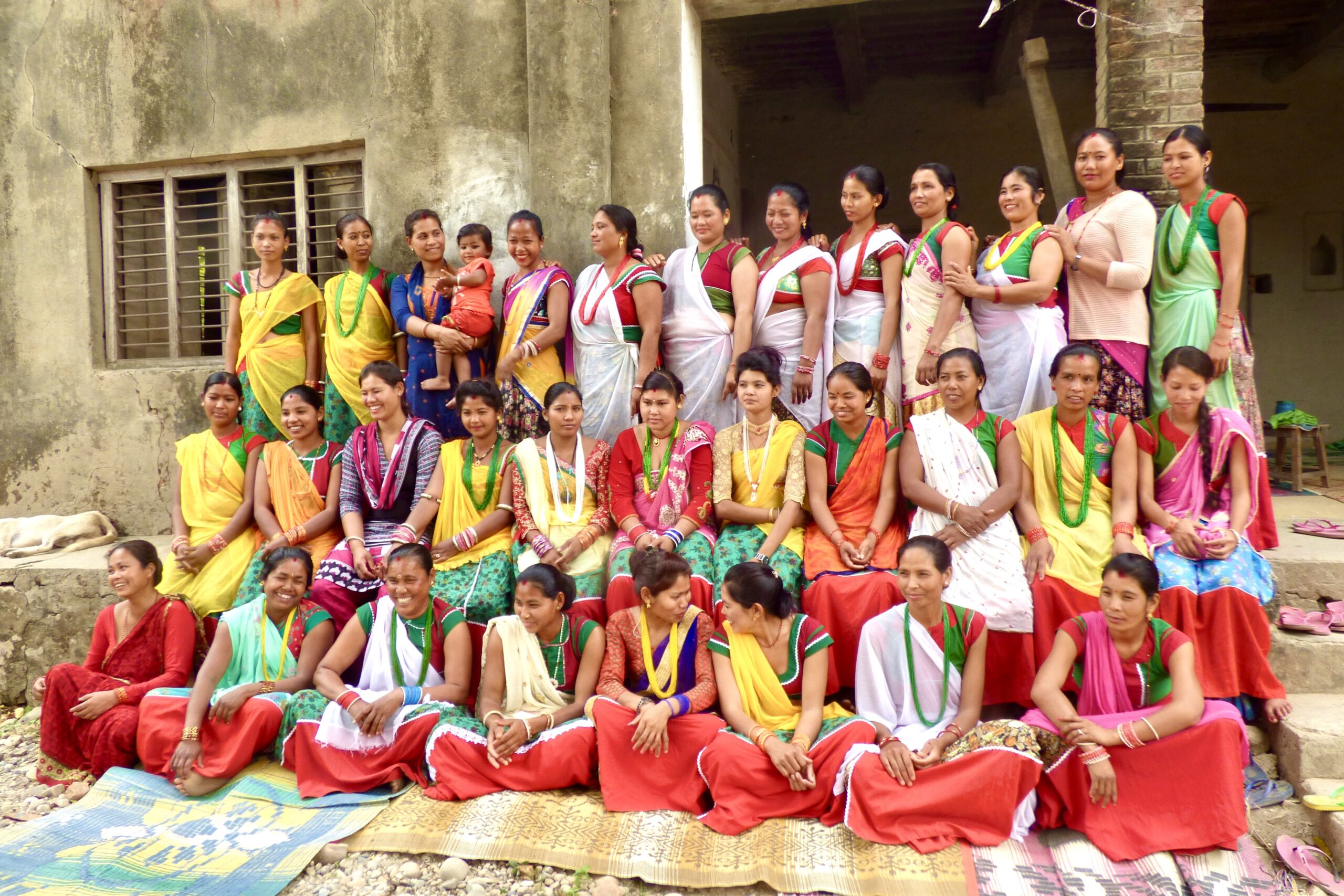Celebrating 30 Years of Aid Through Trade
(Use discount code PEACECORPS30 on Aid Through Trade products for RPCVs)
by Robert Nolan

Artisan Krishna Lata later trained other villagers in making jewelry, including Aid Through Trade signature piece, the Roll-On® bracelet.
It was a frigid winter in 1993, and Damian Jones (Nepal 1987–91) was shivering in a sleeping bag inside his car some- where near the Eastern Market in Washington, D.C.. His big idea, to bring aid to Nepal through artisan trade, was just beginning to take off. Large entities like UNICEF and Save the Children had begun exploring small-scale handicraft initiatives in developing countries, but not in a way that Jones saw as sustainable.
“Nepal receives a ton of aid, and none of it makes its way back to the villages. All this money comes in, but then it’s kind of dependent on more money coming in for the system to work,” he says. “I was also looking for something independent to do back in the United States.
So I thought, ‘What if I could help bring handicrafts from Nepal to the U.S. market?” Jones quickly realized that without a strong business plan, his idea was bound to fail. So, like any good Peace Corps Volunteer, he improvised. Jones began to work local holiday craft markets, driving from one to another on weekends, shaving and showering in rest stops, and employing family members to help promote his wares. “It was freezing, but that was the only way you could get a spot. You had to get in line at like, four in the morning.”
There were also substantial financial risks. Upon returning to the U.S. from Nepal with his first batch of glass bead jewelry in 1993 Jones went door to door to boutiques as something of a traveling salesman, trying to drum up interest and sales. He maxed out his credit cards, borrowed money from friends and family, and took out cash advances to the tune of $100,000. “I was thinking every single person in my Peace Corps group had finished college, continued on to get advanced degrees, and I asked myself, ‘What am I going to do if this doesn’t work out?’”
Fortunately for Jones, it did. In 2023, Aid Through Trade, the jewelry company he founded, celebrated 30 years in business. It stands proud as one of the pioneering models of how a business can empower local communities through commerce. For Jones, this milestone can be hard to believe, especially given Aid Through Trade’s humble origins.
“I was thinking every single person in my Peace Corps group had finished college, continued on to get advanced degrees, and I asked myself, ‘What am I going to do if this doesn’t work out?’”— Damian Jones, Founder, Aid Through Trade
Aid Through Trade’s big break came at the end of the 1990s, when fashion runway models went from barenaked to bedazzled. Demand for artisan jewelry, especially glass bead necklaces and bracelets like the ones being produced by the women Jones worked with in Nepal, skyrocketed. Soon the pieces were being seen and photo- graphed on celebrities like Halle Berry and Christina Aguilera.
Yet success brought new challenges. Demand for glass beads became so great that to supply the Nepali artisans, Jones had to begin importing them from the Czech Republic, Taiwan, and Japan. But with the beads flowing and the business growing, the impact Jones had sought all along began to materialize, and the women in the Nepali villages who were doing the work began to realize real economic benefits.
“The impact of our success … was that we could hire more women,” Jones says. “When you put money into the hands of women, it brings with it prestige, power. So many studies have shown that it’s better for families when women are making the spending decisions.”
However, just as the business began to succeed, Jones and the Nepali artisans were hit with another major hurdle: a civil war. Between 1996
and 2006, Nepal experienced internal conflict that devastated communities across the country. Then, in 2015, natural disaster struck when the country was beset by a major earthquake that claimed 10,000 lives.
During this time, Jones says, Nepalis craved normalcy more than anything else. So Aid Through Trade continued to work in the country despite the dismal and dan- gerous conditions. “People just want to have a normal life when things go upside down. They want work. They felt good coming into the office to do the work, because they felt safe,” he says. “So we worked with a lot of volunteers who helped us move beads to the places where they needed to be. And when there were curfews and people couldn’t come into the office, somebody might be on a bicycle or a moped to help move raw materials and finished orders to people so that they could collect them, moving through checkpoints and other dangerous situations.” Throughout these hard times, appeals for support from Aid Through Trade were met with generosity. Increased jewelry sales in the U.S. helped to support those affected by the conflict and the earthquake.

Thirty female artisans used their income from Aid Through Trade for a road trip to the Buddha’s birthplace, where their colorful dresses turned the heads of locals and tourists alike.
Today, Aid Through Trade is reaping the benefits of offering innovative, creative designs to customers who also want to help provide dignified work for women in Nepal. The company has copyrighted its primary product, “The Original Roll-On Bracelet,” just in time for Jones to retire. While he’s still working on a succession plan, he has laid the foundation for success. Aid Through Trade is one of only a few small businesses in Nepal to establish a retirement fund for its artisans. Women can contribute funds that the company matches at 10 percent—a far more generous amount than most major employers in Western countries offer— in order to build a financial cushion for retiring workers and to make space for the next generation of artisans to begin their jewelry-making careers.
After spending years outside of Nepal, Jones returned in 2019 when a group of 30 female artisans told him they wanted to take a field trip to visit the Buddha’s birthplace, about three hours from their village. The road trip was far more festive than those Jones once took as a traveling salesman. Dressed in colorful garments, the women sang songs, told jokes, and laughed and teased each other along the way.
“Some people say ‘follow your heart,’ which is nice, but sort of clichéd. I like to say ‘follow the energy,’ because sometimes the path that’s des- tined for you is not in your heart and not easy to see.”— Damian Jones, Founder, Aid Through Trade
When they arrived, local Nepalis and tourists alike asked to take pictures with the women and complimented them on their beautiful, vibrant dresses. “Of all the 30 years I’d spent doing this work, that was the highlight for me,” Jones says. “To see these women leave the valley that they had lived in their whole lives, travel on their own money, and spend it on something enjoyable for themselves … wow. It was beautiful.”
For young RPCVs looking for opportunities in social entrepreneurship, Jones has a few words of advice. “Some people say ‘follow your heart,’ which is nice, but sort of clichéd. I like to say ‘follow the energy,’ because sometimes the path that’s destined for you is not in your heart and not easy to see. Sometimes it manifests as fear, or unexpected challenges. But you need some strength, that energy, to pull you through it.”
“I’ve been through some difficult times and I somehow just sort of got up and kept going,” Jones says. “In some ways I feel like I’ve been a Peace Corps Volunteer for the last 36 years.”
Aid Through Trade merchandise is available at https://www.aidthroughtrade.com/
